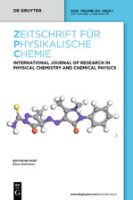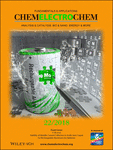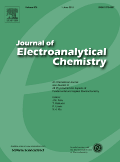
Electrocatalysis
Scope & Guideline
Advancing the Frontiers of Electrochemistry.
Introduction
Aims and Scopes
- Electrocatalyst Development:
Research on the synthesis and optimization of new materials, including metals, metal oxides, and carbon-based composites, aimed at enhancing electrocatalytic reactions such as hydrogen evolution, oxygen reduction, and methanol oxidation. - Electrochemical Sensors:
Innovative designs and applications of electrochemical sensors for detecting various analytes, including pharmaceuticals, environmental pollutants, and biomolecules, leveraging nanomaterials and advanced electrochemical techniques. - Mechanistic Studies:
Investigations into the fundamental mechanisms of electrocatalytic processes, supported by theoretical modeling and experimental data, to better understand the factors affecting catalyst performance. - Sustainable and Green Chemistry:
Focus on environmentally friendly synthesis routes and applications of electrocatalysts, promoting the use of renewable resources and methods that minimize environmental impact. - Energy Conversion and Storage:
Research on the application of electrocatalysts in energy-related fields, particularly in fuel cells and electrolyzers for efficient energy conversion and storage.
Trending and Emerging
- Nanostructured Materials:
There is a significant increase in studies focusing on the synthesis and application of nanostructured materials, such as nanoparticles and nanocomposites, which demonstrate enhanced electrocatalytic activity and stability. - Bimetallic and Alloy Catalysts:
Research on bimetallic and alloy catalysts is trending, as these materials often exhibit superior performance compared to their monometallic counterparts, opening new avenues for efficient electrocatalysis. - Renewable Energy Applications:
There is a growing emphasis on electrocatalytic processes related to renewable energy, including CO2 reduction and water splitting, highlighting their importance in addressing climate change and sustainability. - Integration with Artificial Intelligence:
The incorporation of machine learning and AI in the design and optimization of electrocatalysts is emerging as a novel trend, potentially accelerating discovery and improving performance predictions. - Advanced Characterization Techniques:
The use of advanced characterization techniques, such as in situ and operando methods, is becoming more popular, allowing researchers to gain deeper insights into the behavior of electrocatalysts under real operational conditions.
Declining or Waning
- Traditional Electrocatalysts:
Research on conventional electrocatalysts, particularly those based on platinum and noble metals, has seen a decline as the field shifts towards more sustainable and cost-effective materials. - Single-Use Sensors:
There is a noticeable decrease in the development of one-time-use electrochemical sensors, as the focus is moving towards more robust and reusable sensing technologies that can provide long-term monitoring solutions. - Basic Electrochemical Techniques:
Standard electrochemical methods such as cyclic voltammetry without advanced modifications or novel applications are being overshadowed by more innovative approaches that incorporate nanotechnology and complex materials. - Non-Electrochemical Applications:
Research that strays from the core focus of electrocatalysis and delves into unrelated fields, such as purely chemical synthesis without electrochemical relevance, is becoming less prominent.
Similar Journals

APPLIED CATALYSIS A-GENERAL
Pioneering the Future of Catalysis Research.Applied Catalysis A-General is a premier journal published by Elsevier that serves as a vital resource in the fields of catalysis, process chemistry, and technology. Founded in 1991, this esteemed journal has garnered considerable recognition, reflected in its classification in the Q2 quartile for both catalysis and process chemistry in 2023, as well as its notable rankings within the Scopus database, placing it among the top 20 journals in related disciplines. With an ISSN of 0926-860X and an E-ISSN of 1873-3875, the journal provides a platform for researchers and professionals to disseminate cutting-edge research findings, facilitate knowledge transfer, and foster innovation in the field. While not an open-access journal, it remains accessible through institutional subscriptions, ensuring that critical findings reach a broad audience. The journal's objectives include advancing the understanding of catalytic processes and their applications, making it an indispensable tool for those engaged in this dynamic area of study. Applied Catalysis A-General continues to play a vital role in shaping the future of catalysis, contributing to both scientific progression and practical advancements in various industries.

JOURNAL OF THE ELECTROCHEMICAL SOCIETY
Driving Theoretical and Experimental Breakthroughs in ElectrochemistryJOURNAL OF THE ELECTROCHEMICAL SOCIETY, published by the ELECTROCHEMICAL SOCIETY INC, is a leading peer-reviewed academic journal dedicated to advancing the field of electrochemistry and its myriad applications. With an ISSN of 0013-4651 and E-ISSN of 1945-7111, this esteemed journal has been a pivotal platform for research since its inception in 1948, with convergence periods allowing for a rich historical context of study through to 2024. Recognized for its high impact, it holds a noteworthy Q1 ranking in several categories including Condensed Matter Physics and Materials Chemistry, and it is Q2 ranked in both Electrochemistry and Renewable Energy. This journal features a range of articles that encompass both theoretical and experimental advancements, making it a crucial resource for researchers, professionals, and students keen on exploring cutting-edge developments in materials science, energy solutions, and sustainable technologies. Although it is not an open access journal, its rigorous standards ensure that published work significantly contributes to the body of knowledge within its fields, fostering innovative research and collaborative progress.

ZEITSCHRIFT FUR PHYSIKALISCHE CHEMIE-INTERNATIONAL JOURNAL OF RESEARCH IN PHYSICAL CHEMISTRY & CHEMICAL PHYSICS
Innovating Research in Chemical PhysicsZEITSCHRIFT FUR PHYSIKALISCHE CHEMIE-INTERNATIONAL JOURNAL OF RESEARCH IN PHYSICAL CHEMISTRY & CHEMICAL PHYSICS, published by WALTER DE GRUYTER GMBH, is a highly regarded platform for researchers in the field of physical chemistry and chemical physics. With an ISSN of 0942-9352 and an E-ISSN of 2196-7156, this journal serves as a vital resource for the dissemination of original research, critical reviews, and insightful discussions that span theoretical and experimental investigations. Recognized for its quality, it holds a Q2 classification within the 2023 quartiles of Physical and Theoretical Chemistry and ranks 72nd out of 189 in the Scopus database, placing it in the 62nd percentile. The journal’s extensive publication history, originating from 1943, showcases its long-standing commitment to advancing the understanding of complex chemical phenomena. Although it currently does not offer open-access options, it continues to attract contributions from leading experts worldwide, making it essential reading for professionals, researchers, and students dedicated to pushing the frontiers of chemical science. The journal is located in Berlin, Germany, at Genthiner Strasse 13, D-10785 Berlin, Germany.

Energy Materials
Empowering Energy Technologies Through Cutting-Edge Research.Energy Materials is a pioneering journal published by OAE PUBLISHING INC, dedicated to the dynamic field of energy materials science and engineering. With a focus on advancing knowledge related to materials used in various energy applications such as batteries, fuel cells, and solar cells, this open-access journal aims to disseminate cutting-edge research and innovative methodologies to a global audience. By offering a platform for original research, reviews, and case studies, Energy Materials plays a crucial role in bridging the gap between materials science and energy technology, facilitating the development of sustainable energy solutions. Researchers, professionals, and students alike will find invaluable insights in its pages, fostering advancements in this essential sector. To explore the latest developments in energy materials, visit Energy Materials at OAE PUBLISHING INC.

Electrochemical Science Advances
Connecting Ideas, Inspiring Innovations in ElectrochemistryElectrochemical Science Advances, published by WILEY, is an esteemed Open Access journal that has been making significant contributions to the field of electrochemistry since its inception in 2021. With an ISSN of 2698-5977, this journal serves as a vital platform for researchers and practitioners looking to disseminate their findings on a diverse range of topics within the electrochemical sciences and related areas. The journal has achieved commendable rankings in the Scopus database, placing it in the 2nd quartile in Chemistry (miscellaneous) and the 3rd quartile in Electrochemistry, highlighting its relevance and growing influence in the academic community. As it converges from 2021 to 2024, Electrochemical Science Advances aims to foster collaboration and innovation, offering a vital resource for students, professionals, and researchers dedicated to advancing knowledge and technology in electrochemistry. Access to this cutting-edge research is straightforward, allowing for a comprehensive engagement with the latest advances in the field.

TRANSACTIONS OF TIANJIN UNIVERSITY
Championing high-quality contributions in a dynamic academic landscape.TRANSACTIONS OF TIANJIN UNIVERSITY, published by SpringerNature, is a premier journal in the field of multidisciplinary research, boasting an impressive Q1 ranking and placing within the top 93rd percentile of its category according to Scopus. With an ISSN of 1006-4982 and E-ISSN of 1995-8196, this journal facilitates insightful and innovative contributions that span various disciplines, making it a vital resource for academics and professionals alike. Established in 2004, the journal continues to thrive with a commitment to advancing knowledge and fostering collaboration in scientific inquiry. TRANSACTIONS OF TIANJIN UNIVERSITY aligns with global research trends and offers a platform for the dissemination of high-quality research findings, promoting interdisciplinary approaches to solving complex problems. Located in China, its influence extends well beyond national borders, appealing to a diverse readership eager to explore the latest advancements and discussions in the multidisciplinary arena.

ChemElectroChem
Catalyzing knowledge in electrochemical research.ChemElectroChem is a premier open-access journal published by WILEY-V C H VERLAG GMBH, focusing on the interdisciplinary fields of catalysis and electrochemistry. Established in 2014 and actively publishing until 2024, this journal boasts an impressive reputation, currently ranked in the Q2 category for both catalysis and electrochemistry according to the 2023 metrics. With an Scopus ranking placing it in the 74th percentile for Electrochemistry and 61st for Chemical Engineering and Catalysis, ChemElectroChem serves as an essential platform for researchers, professionals, and students dedicated to advancing knowledge and fostering innovation in these critical scientific domains. Since its transition to open access in 2023, the journal aims to maximize the dissemination of cutting-edge research and facilitate the exchange of ideas among global scholars, thereby enhancing the accessibility and impact of high-quality science within the community. For those engaged in the ever-evolving conversations around energy storage, conversion processes, and sustainable solutions, ChemElectroChem is an invaluable resource.

Carbon Letters
Connecting Academia with Cutting-edge Carbon Discoveries.Carbon Letters, published by SPRINGER JAPAN KK, is a premier academic journal based in Singapore that focuses on groundbreaking research in the fields of Ceramics and Composites, Energy Engineering, Inorganic Chemistry, Materials Chemistry, and Organic Chemistry. With an exceptional reputation reflected in its 2023 category quartiles, which include Q1 rankings across multiple disciplines, this journal serves as a vital resource for researchers and professionals seeking to stay at the forefront of carbon-related studies and applications. Although it is not an open access publication, Carbon Letters facilitates the dissemination of high-quality research addressing contemporary challenges in renewable energy, sustainability, and environmental engineering, supporting the academic community's efforts in advancing science and technology. The journal has a robust converged period from 2014 to 2024, signaling its ongoing commitment to excellence in academia.

Carbon Energy
Leading the charge in carbon energy research and innovation.Welcome to Carbon Energy, an esteemed open-access journal published by WILEY that focuses on cutting-edge research in the field of energy and materials science. Since its inception in 2019, this journal has quickly established itself as a leading platform for disseminating impactful findings and innovations related to carbon-based energy solutions, renewable resources, and sustainability practices. With its impressive Q1 rankings in multiple categories—including Energy (miscellaneous), Materials Chemistry, and Renewable Energy—Carbon Energy is recognized for delivering high-quality, peer-reviewed content that meets the rigorous standards of the academic community. Through its open-access model, the journal ensures wide accessibility of research findings, making it an invaluable resource for researchers, professionals, and students alike. As we look toward the future, Carbon Energy aims to further its mission of advancing sustainable energy technologies and promoting interdisciplinary collaboration in tackling global energy challenges.

Journal of Electroanalytical Chemistry
Fostering Excellence in Electrochemical ResearchThe Journal of Electroanalytical Chemistry, published by Elsevier Science SA, stands as a leading platform for the dissemination of cutting-edge research in the field of electroanalytical science. With an impressive impact factor that reflects its esteemed reputation—ranking in the Q1 category for both Analytical Chemistry and Chemical Engineering, alongside a strong presence in Electrochemistry—this journal provides a vital resource for researchers, professionals, and students alike. Covering topics from fundamental electrochemical processes to innovative analytical techniques, the journal aims to foster an in-depth understanding and discussion of contemporary advancements in electroanalytical methodologies. Operating under a model that prioritizes quality and rigor, it facilitates access to high-quality manuscripts and reviews that contribute to the advancement of the field. For over six decades, from 1959 to 2024, it has played an intrinsic role in shaping the landscape of electrochemistry, continually driving forward the frontiers of knowledge and application.